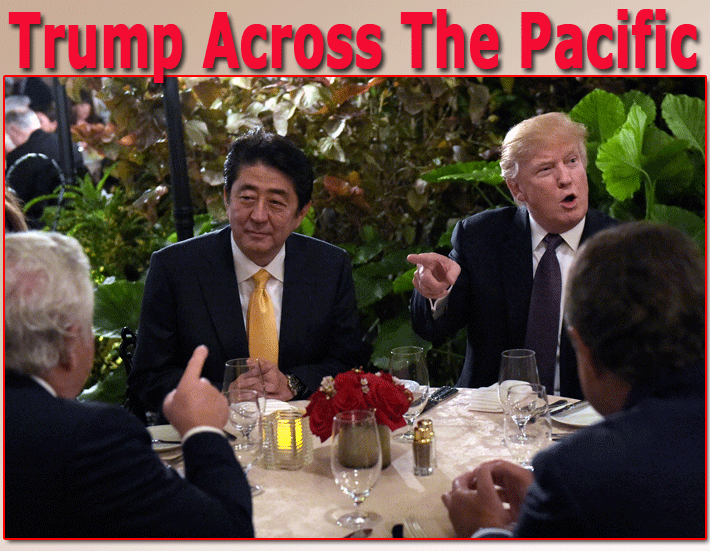
Abe & The Donald supped
at Mar-A-Lago. President Donald
Trump, second from right, sat
down to dinner with Japanese
Prime Minister Shinzo Abe, second
from left, in Palm Beach, Florida,
last month.
The same type of meet &
greet is planned with Chinese
President Xi Jinping next month
in the same place as the U.S.
moves to lower the temperature
in Asia trade and politics.
In the meantime, the rest of
Asia waits. |
The
Trump Presidency and, more specifically,
what it means for trade and logistics,
is befuddling analysts and industry
insiders. Investors in U.S.
stock markets seem certain that a
pro-business government determined
to boost exports, employment, and
manufacturing and increase spending
on infrastructure will benefit transport
demand across the modes.
Viewing
TPP Exit
But
for many, pulling out of the Trans-Pacific
Partnership (TPP) was an open invitation
from the U.S. for China to take its
mantle as the leader of global trade
policy. And policies (and tweets)
that create uncertainty about the
U.S.-EU relationship and the future
of NAFTA, and raise the possibility
of a trade war with China, are treated
with incomprehension.
“There
are a lot of mixed messages,”
said one regional trade association
president who requested anonymity.
“But when people aren’t
laughing at this Presidency and its
almost daily crises, they are very
concerned.
“It’s
hard to factor in the risk of U.S.
policy and how it will apply to global
trade practices when it seems that
policy is being made on the hoof.
A lot of our members also have concerns
about security and how this might
impact trade flows and the political
environment.
“And
no one really understands how the
U.S. could benefit from taking on
China in a trade war. It would just
increase prices of consumer goods
in the U.S.”
Peeking
Through Fingers
A
leading forwarder based in Europe
said he was watching the Trump Presidency
“through his fingers.”
“It’s
painful to see. We manage a lot of
Europe-U.S. business by air and sea,
and our customers really don’t
know what to make of it, or how to
plan ahead and incorporate political
risk into their supply chains. It’s
a case of looking at all the many
twists and turns that could be taken
by this administration and then hoping
for the best but preparing for the
worst.”
Trying
To Focus
Ocean
shipping analyst Drewry said it was
hard to analyze the new administration’s
trade intentions at this early stage,
but predicted Trump would continue
to make protectionist anti-FTA noises
(digitally and verbally), and that
the U.S. would backtrack from entering
into any broad agreements like the
Transatlantic Trade and Investment
Partnership (TTIP).
No
Shots Through The Foot
However,
Drewry said it was unlikely the Trump
administration would introduce any
legislation that might harm U.S. trade
competiveness and risk job losses
and higher prices at home.
“Assuming
we are correct and all that happens
is a bit more symbolic relocating
back to America, to satisfy Trump
voters, there shouldn’t be too
much change to the status quo, meaning
little adjustment to our container
forecasts will be necessary,”
said Drewry.
“If
we are wrong, the likely losers will
be the US.
“Reports
that China could replace the U.S.
in the TPP agreement points to a future
when the rest of the world moves on
and simply trades more with each other.
“If
Trump does impose trade barriers and
high tariffs, other countries will
definitely retaliate and then U.S.
exports will suffer.”
Cannot
Win Trade War
 Nigel Driffield, (left) a Professor
of International Business at Warwick
Business School and a consultant and
researcher for the World Bank, the
European Commission, and several UK
Government Departments, told FlyingTypers that a trade war with China was a
conflict that President Trump could
not win.
Nigel Driffield, (left) a Professor
of International Business at Warwick
Business School and a consultant and
researcher for the World Bank, the
European Commission, and several UK
Government Departments, told FlyingTypers that a trade war with China was a
conflict that President Trump could
not win.
“I
don’t pretend to be an expert
on what is shipped by air as opposed
to sea, but what he is seeking to
do is bring jobs back to the U.S.,”
he said.
“Well,
let’s say that Apple stop using
Foxconn. There is nothing to suggest
that the factories of Ohio or Pennsylvania
can deliver that capacity—at
least in the short run. All that will
happen is that Apple’s prices
will go up, and maybe more people
will buy Samsung phones.
“If
China retaliates, then certain U.S.
exports will be hit, and I can see
those declining as China can essentially
switch to European or Japanese producers
and dump U.S. government debt.
“Basically
this is a trade war Trump can’t
win. Protectionism is akin to holding
back the tide—one can do this
for a while, but in the long-term
it is not sustainable.
“The
current thinking by President Trump
seems to be framed by the belief that
trade barriers are a solution to job
losses, particularly in the so-called
rust-belt, which was one of his key
constituencies. At the margin, there
is no doubt that tariffs can influence
both trade and investment decisions,
but there is no evidence that in the
long-term this is effective in protecting
employment,” Nigel Driffield
said.
Air
Cargo Weathered Eye
 Certainly, many in the air freight
industry will hope Trump does not
take the advice of Adams Nager, (right)
Economic Policy Analyst at Washington-based
think tank Information Technology
and Innovation Foundation. He argued
earlier this month that any trade
war instigated by the Trump administration
should focus on China—which
generates major volumes of air freight—rather
than neighboring Mexico, which does
not.
Certainly, many in the air freight
industry will hope Trump does not
take the advice of Adams Nager, (right)
Economic Policy Analyst at Washington-based
think tank Information Technology
and Innovation Foundation. He argued
earlier this month that any trade
war instigated by the Trump administration
should focus on China—which
generates major volumes of air freight—rather
than neighboring Mexico, which does
not.
Nager
claimed ‘losing a job’
to China was much more damaging for
the United States than losing a job
to Mexico because a) Mexico’s
manufacturing sector is integrated
with U.S. supply chains and success
is shared; and b) Mexico generally
abides by global rules and guidelines
governing fair international trade
practices, while China “aggressively”
does not.
“I
don't think an ideal policy response
to Chinese bad practices would invoke
a true 'trade war’ or, because
that term is amorphous, a sharp decline
in the volume of trade between the
U.S. and China,” he told FlyingTypers.
“To
me, increasing the amount of goods
flowing from the U.S. to China would
benefit shipping because now they
can haul goods in both directions.
U.S. goods to China represent just
a fraction of Chinese goods going
to the U.S. And U.S. goods may be
less bulky as they tend to contain
more knowledge-components.”
But
he concluded that if the federal government
was to spend its political capital
fighting Mexico, it would be much
less able to mount an effective challenge
to ‘Chinese innovation mercantilism.’
“In
short, the Trump administration needs
to choose its battles carefully,”
said Nager.
Sky King
To Read Part 1 of This Series,
Click Here
To Read Part 2 of This Series, Click Here
To Read Part 3 of This Series, Click Here
To Read Trump Effect—India Walks
Softly Carries Big Stick, Click Here
To Read Trump Effect—Implications
Of A Trump Trade War, Click Here
|





